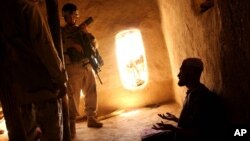At the same time U.S. President Barack Obama is trying to wind down the U.S. war in Afghanistan and refrain from putting “boots on the ground” in Iraq, administration officials are making the case for continued and future military operations against groups like the Islamic State, al-Qaida and even the Taliban.
The goal, according to U.S. defense officials, is to create a “framework” that will allow the president to use military force to persistently target and take down groups that currently threaten the United States.
"The last 14 years have taught us that the threats we face tomorrow will not be the same as the threats we faced yesterday or face today," said Defense Department General Counsel Stephen Preston said Friday in prepared remarks to the American Society of International Law.
“The challenge is to ensure that the authorities for U.S. counterterrorism operations are both adequate and appropriately tailored to the present and foreseeable threat,” said Preston.
Undetermined end game
One difficulty with current conflicts is determining when they are over, Preston said. "In an armed conflict between a state and a terrorist organization like al-Qaida or ISIL [Islamic State], it is highly unlikely that there will ever be an agreement to end the conflict. Unlike at the close of the World Wars, there will not be any instruments of surrender or peace treaties."
The process of creating a framework has been a difficult one. For months, the White House and lawmakers have argued over the extent of the president’s powers, some in Congress charging that Obama overstepped his constitutional authority when he ordered military operations against Islamic State last August.
Draft legislation for an Authorization for the Use of Military Force (AUMF) against Islamic State, submitted to Congress in February, has gone nowhere.
Legislation's message
Administration officials have said the legislation is not legally necessary and is designed only to show the militants, and the world, a united front. They argue the president is well within his rights to order strikes against Islamic State because it grew out of an al-Qaida-linked organization.
The AUMF approved by Congress in 2001, and passed in the days following the 9/11 terror attacks against the World Trade Center in New York and the Pentagon, authorized force against al-Qaida and "associated" groups like the Taliban.
Some lawmakers contend neither of those authorizations support military action against Islamic State, saying the 2001 authorization was limited to al-Qaida, which claimed responsibility for the 9/11 attacks, and the Taliban, which supported al-Qaida.
In any case, Law Professor Ilya Somin told VOA, Islamic State is definitely not now associated with al-Qaida. "The two organizations are enemies and are fighting each other. Associated can't mean a force that is the military enemy of al-Qaida."
Somin, who teaches at George Mason University in Virginia, calls Preston's presentation of the legal justification for war against Islamic State a "more nuanced" version of the administration's past arguments. "You cannot stretch laws that authorize war," he says.
AUMF questions
But Preston said Friday a restrictive interpretation of the 2001 authorization would handcuff the U.S., while enabling its enemies.
“[It] would allow the enemy - rather than the President and Congress - to control the scope of the AUMF by splintering into rival factions while continuing to prosecute the same conflict against the United States,” he said.
Somin said he is troubled that the Obama administration will not admit that a new AUMF, specifically authorizing use of force against Islamic State is needed. "The president has twice waged war without Congressional authorization," he says, once in Libya and now against Islamic State. "They should ask themselves, what will happen next time."
Preston, too, expressed hope that talks with Congress can lead to a constructive outcome.
“We might also create a model to guide future efforts to refine the 2001 AUMF or otherwise authorize the use of force against some new threat we may not yet foresee,” he said.




